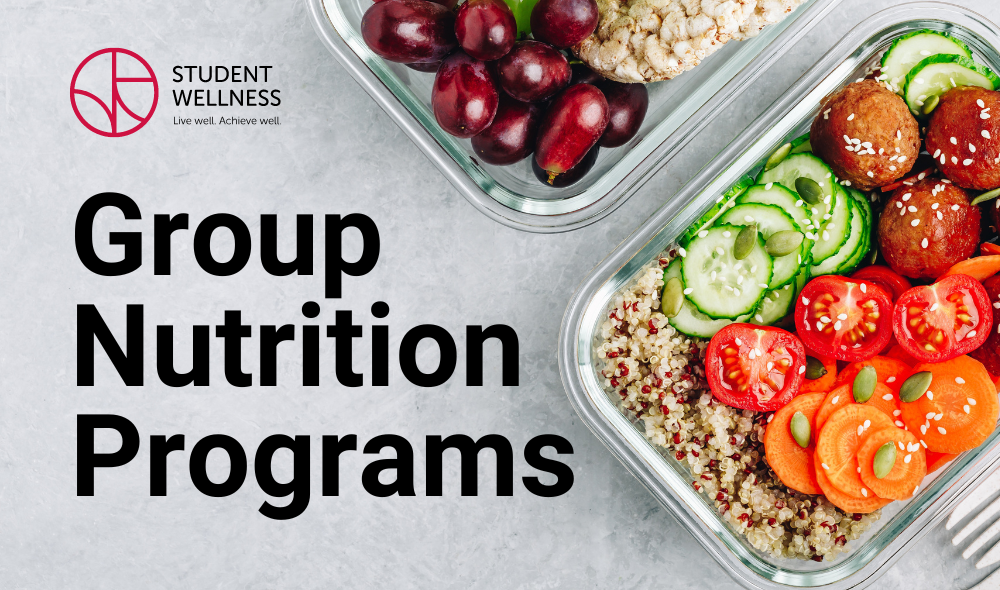Group Nutrition Programs

Group nutrition services are available for no additional cost for University of Guelph students. These programs are designed to address common nutrition concerns amongst university students and are meant to give students access to nutrition advice at the time of their concern, with little or no wait. No registration or referral is required for group nutrition services. Each session is independent, and students may attend as many sessions as they would like. Learn more about our Dietitian Services at the University of Guelph available for students.
Meal Planning Made Easy
What is meal planning? Slaving away over the stove for hours on a Sunday afternoon? Eating the same meal exclusively every single day? Meal planning can actually be many things and tailored to meet individual lifestyles and needs. Join Jessie Trupp, Hospitality Services Registered Dietitian, to learn about:
- Meal planning strategies and cooking methods
- Recipes and resources
- Tips for nutritious eating on a budget
Each group is independent (i.e, this is not a series with three sessions). No registration or referral is required.
Building a Plant-Rich Diet
A plant-rich diet is a diet that contains more plants! This means fruits, veggies, grains, and protein sources from plants like legumes, nuts, and tofu. A plant-rich diet does not need to be a strictly vegetarian or vegan diet.
Join Cara Kasdorf, Student Wellness Services Registered Dietitian, to learn about:
- The risks and benefits of a plant-rich diet
- Nutrients of concern when following a plant-rich diet and the role of supplements
- Strategies to meet energy needs including meal ideas and time-saving strategies
Each group is independent (i.e, this is not a series with three sessions). No registration or referral is required.
Managing Low Appetite
Having trouble finding the energy and motivation to grocery shop and prepare food? Finding it hard to think of things that you even like the taste of? Low appetite can create a frustrating cycle that leads to lower intake, lower energy and even lower mood or higher anxiety.
Join Lindzie O’Reilly, Student Wellness Services Registered Dietitian, to learn about:
- Some of the reasons low appetite may occur, including stress, anxiety, depression, medication
- The difference between hunger and appetite
- Strategies to manage low appetite so that it doesn’t further contribute to low mood, low energy, or poor concentration and focus
Each group is independent (i.e, this is not a series with three sessions). No registration or referral is required.
Managing Cravings
Did you know that stressed is desserts spelled backwards?? It’s really normal to experience an increase in cravings during periods of high stress. That said, experiencing cravings that feel impulsive or unmanageable can be distressing. Attempting to manage cravings by avoiding specific foods or food situations can actually make cravings worse.
Join Cara Kasdorf, Student Wellness Services Registered Dietitian, to learn about:
- The many reasons that cravings can occur
- Adopting a compassionate approach to fueling your body and mind
- Nutrition strategies to support you in managing stress, anxiety, and cravings
Each group is independent (i.e, this is not a series with three sessions). No registration or referral is required.
Nutrition Management of Poly Cystic Ovary Syndrome (PCOS)
Receiving a diagnosis of PCOS can feel overwhelming and confusing. Often, treatment recommendations for PCOS include advice to lose weight, with little or no guidance around how to manage the symptoms of PCOS.
Join Lindzie O’Reilly, Student Wellness Services Registered Dietitian, to learn about:
- What PCOS is and how it affects the body
- How stress factors in to PCOS symptoms
- How habits like including protein and fibre with meals can decrease PCOS symptoms so you can feel your best
Each group is independent (i.e, this is not a series with three sessions). No registration or referral is required.



